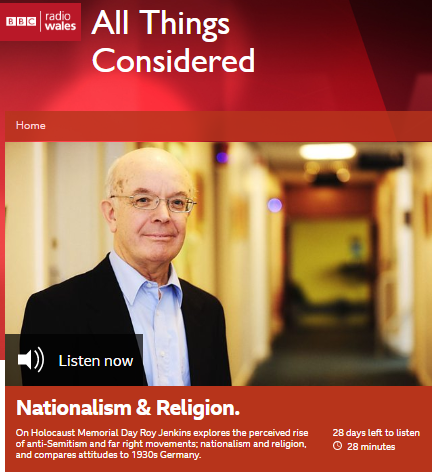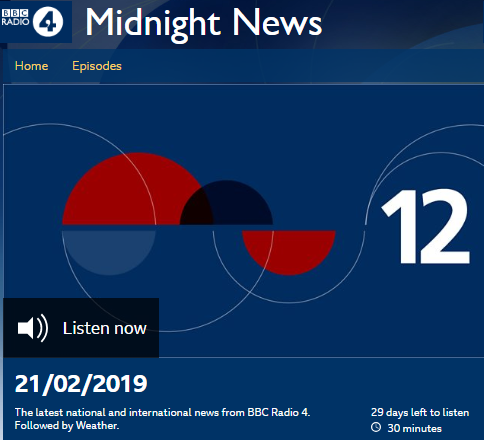On January 27th BBC Radio Wales aired an edition of the programme ‘All Things Considered’ titled ‘Nationalism & Religion’.
“On Holocaust Memorial Day Roy Jenkins explores the perceived rise of anti-Semitism and far right movements; nationalism and religion, and compares attitudes to 1930s Germany.
As the remains of six unknown victims of Auschwitz were buried in Hertfordshire last Sunday – one for every million Jewish people killed by the Nazis – the Chief Rabbi urged an end to rising anti-Semitism. Later in the week, the country’s most senior counter-terrorism officer warned that the ‘febrile’ atmosphere around Brexit could be exploited by far right extremists. At a time of heightened division and the rise of right-wing nationalist movements across Europe, and in other parts of the world, some draw disturbing parallels with the Germany of the 1930s. On Holocaust Memorial Day, Roy Jenkins asks is such talk merely alarmist?
Wales has had its own nationalist party for more than 90 years, with elected representatives at Westminster, in Brussels and in the Welsh Assembly. Plaid Cymru is part of the political establishment, hardly sinister – there are clearly important distinctions to be made. So just what is nationalism? And in what ways is it bound up with religion?
Joining Roy to discuss the issues are Dan Cohn-Sherbok, ordained Reform Rabbi and Professor Emeritus of Judaism at the University of Wales Trinity St. David; The Rev’d Aled Edwards, Chief Executive of Cytun, Churches Together in Wales, active in issues of equality, racism and the care of refugees and asylum seekers; and Sinisa Malesevic, Professor of Sociology at University College Dublin, who has written and lectured widely on nationalism, ethnicity and identity.”
In contrast to the impression given in that synopsis – and repeated by the presenter in his introduction – the fact that the remains of six people murdered in Auschwitz were buried in Bushey and the fact that the number of Jewish victims of the Holocaust is six million is coincidental.
Despite the programme’s given description, listeners actually heard remarkably little about “the perceived rise of antisemitism” in the UK and what they did hear came mostly from contributor Dan Cohn-Sherbok. [emphasis in bold added]
06:24 Jenkins: “Dan – rising levels of antisemitism. As a Jewish person living and working around the UK, what’s your experience?”
Cohn-Sherbok: “Well I know that some of my fellow co-religionists are concerned about what they perceive as rising antisemitism and this is all tied up I think with the State of Israel and criticism of Israeli policy. I personally don’t feel that I’m living in any kind of an antisemitic environment. It’s really philosemitic and particularly in Wales. I have lots of friends and I don’t feel it but I know that there are currents of criticism of Israel and this worries a lot of Jews.”
Jenkins: “And do people talk to you directly about it, expressing their concerns?”
Cohn-Sherbok: “Not really. There’s much more concern about Brexit and about American politics. But I know, reading the Jewish newspapers and being informed about what’s going on in the Jewish world, that there is concern and people don’t feel comfortable about being Jewish.”
26:13 Cohn-Sherbok: “Well I think that what the Holocaust has illustrated to Jews is that in times of terrible deprivation and economic instability a society can look for a target and in Nazi Germany the targets were the Jews. And they were rejected on racial grounds and also on religious grounds. Being Jewish meant that you were an outsider. You were an outsider in terms of race and an outsider in terms of religion. So it seems to me that is really the lesson of the Holocaust – that you can turn the outsider into the enemy and that can result in the most terrible circumstances.”
28:55 Cohn-Sherbok: “I think as far as the Jewish community is concerned we’re not doing enough to reach out to the Muslim community. It’s all mixed up with Israel and the Palestinians but we need to try to find some way of building a bridge between the Jewish community and the Muslim community and Jewish leaders are not doing enough. We need to do much more.”
So did this programme meet the BBC’s public purpose obligations to its funding public by contributing to their understanding of antisemitism in their own country?
The employment of the term “perceived” in relation to rising antisemitism in both the programme description and in Cohn-Sherbok’s contribution obviously hinders audience understanding of the fact that the number of antisemitic incidents recorded by the Community Security Trust has risen over the past decade.
The claim that antisemitism in the UK is “all tied up with” – i.e. exclusively linked to – the State of Israel is inaccurate and misleading and does not reflect the findings of the CST (see page 11) either in terms of the proportion of incidents showing evidence of political motivation or the differing types of motivation.
“Of the 727 antisemitic incidents reported to CST during the first six months of 2018, 154 incidents, or 21 per cent, showed evidence of political motivation. Of these, 67 incidents showed evidence of far right motivation; 77 showed evidence of anti-Israel motivation; and ten showed evidence of Islamist motivation. All incidents needed to show evidence of antisemitism alongside any political motivation in order to be recorded by CST as an antisemitic incident.”
The claim that antisemitism in the UK is linked to “criticism of Israeli policy” and “criticism of Israel” is inaccurate and misleading, as is the claim that “a lot of Jews” are worried by such criticism. As the IHRA working definition of antisemitism clearly states:
“…criticism of Israel similar to that leveled against any other country cannot be regarded as antisemitic.”
Israel-linked antisemitic incidents in the UK do not fall into the category of legitimate “criticism of Israeli policy” as Cohn-Sherbok misleadingly claims. Likewise, his portrayal of antisemitism as a reaction to “terrible deprivation and economic instability” clearly does nothing to enhance listener understanding of antisemitism in 21st century Britain.
That this programme was aired on Holocaust Memorial Day obviously makes its failure to contribute to audience understanding of contemporary antisemitism in the UK – and even mislead listeners on that topic – even more unfortunate.




